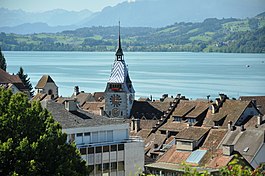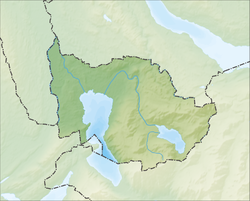
Back Zug (Stadt) ALS زوغ (سويسرا) Arabic زوج ARZ زوگ AZB Цуг (горад) Byelorussian Цуг (горад) BE-X-OLD Цуг Bulgarian Zug (kêr) Breton Zug (Suïssa) Catalan Zug CBK-ZAM
Zug | |
|---|---|
 View over Lake Zug with the old town of Zug and the Zytturm | |
|
| |
| Coordinates: 47°10′05″N 08°31′01″E / 47.16806°N 8.51694°E | |
| Country | Switzerland |
| Canton | Zug |
| District | n.a. |
| Government | |
| • Executive | Stadtrat with 5 members |
| • Mayor | Stadtpräsident (list) Karl Kobelt FDP/PRD (as of 2018) |
| • Parliament | Grosser Gemeinderat with 40 members , instaured 1963) |
| Area | |
| • Total | 21.61 km2 (8.34 sq mi) |
| Elevation (Landsgemeindeplatz) | 425 m (1,394 ft) |
| Highest elevation (Zugerberg) | 1,039 m (3,409 ft) |
| Lowest elevation (Sumpf (Dorfbach)) | 415 m (1,362 ft) |
| Population (31 December 2018)[2] | |
| • Total | 30,542 |
| • Density | 1,400/km2 (3,700/sq mi) |
| Demonym | German: Zuger/Zugerin |
| Time zone | UTC+01:00 (Central European Time) |
| • Summer (DST) | UTC+02:00 (Central European Summer Time) |
| Postal code(s) | 6300 |
| SFOS number | 1711 |
| ISO 3166 code | CH-ZG |
| Surrounded by | Cham, Baar, Walchwil, Steinhausen, Unterägeri |
| Twin towns | Fürstenfeld (Austria), Kalesija (Bosnia-Herzegowina), Vișeu de Sus (Romania) |
| Website | stadtzug SFSO statistics |
Zug (Standard German: [tsuːk] , Alemannic German: [tsuːɡ̊]; French: Zoug; Italian: Zugo; Romansh: Zug; Neo-Latin: Tugium)[Note 1] is the largest town and capital of the Swiss canton of Zug. Its name, translating from German as "pull" or "tug", originates from the fishing vocabulary; in the Middle Ages it referred to the right to pull up fishing nets and hence to the right to fish.
The municipality had a total population of 30,934 in 31 December 2020.[3] The official language of Zug is the Swiss variety of Standard German, but the main spoken language is the local variant of the Alemannic Swiss German dialect.
- ^ a b "Arealstatistik Standard - Gemeinden nach 4 Hauptbereichen". Federal Statistical Office. Retrieved 13 January 2019.
- ^ Error: Unable to display the reference properly. See the documentation for details.
- ^ "Ständige und nichtständige Wohnbevölkerung nach institutionellen Gliederungen, Geburtsort und Staatsangehörigkeit". bfs.admin.ch (in German). Swiss Federal Statistical Office - STAT-TAB. 31 December 2020. Retrieved 21 September 2021.
Cite error: There are <ref group=Note> tags on this page, but the references will not show without a {{reflist|group=Note}} template (see the help page).
© MMXXIII Rich X Search. We shall prevail. All rights reserved. Rich X Search




